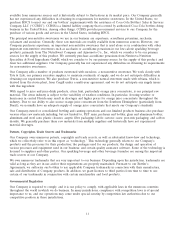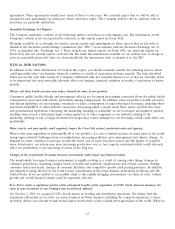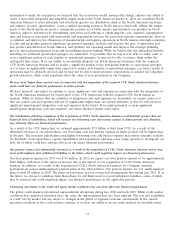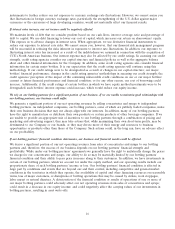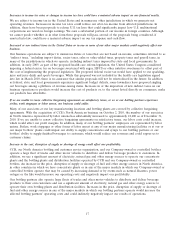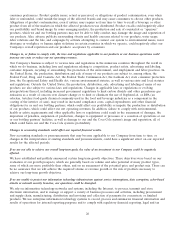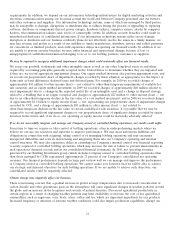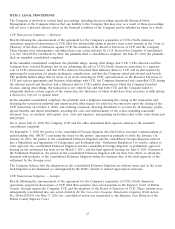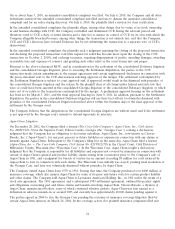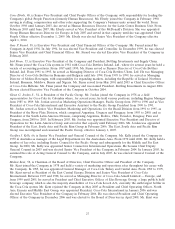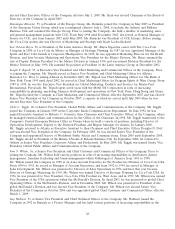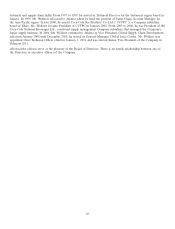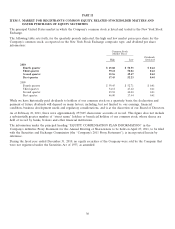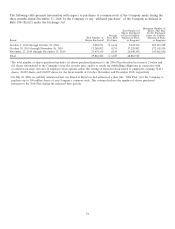Coca Cola 2010 Annual Report Download - page 23
Download and view the complete annual report
Please find page 23 of the 2010 Coca Cola annual report below. You can navigate through the pages in the report by either clicking on the pages listed below, or by using the keyword search tool below to find specific information within the annual report.requirements. In addition, we depend on our information technology infrastructure for digital marketing activities and
electronic communications among our locations around the world and between Company personnel and our bottlers
and other customers and suppliers. Our information technology systems, some of which are managed by third-parties,
may be susceptible to damage, disruptions or shutdowns due to failures during the process of upgrading or replacing
software, databases or components thereof, power outages, hardware failures, computer viruses, attacks by computer
hackers, telecommunication failures, user errors or catastrophic events. In addition, security breaches could result in
unauthorized disclosure of confidential information. If our information technology systems suffer severe damage,
disruption or shutdown and our business continuity plans do not effectively resolve the issues in a timely manner, we
may lose revenue and profits as a result of our inability to timely manufacture, distribute, invoice and collect payments
for concentrate or finished products, and could experience delays in reporting our financial results. In addition, if we
are unable to prevent security breaches, we may suffer financial and reputational damage because of lost or
misappropriated confidential information belonging to us or to our bottling partners, customers or suppliers.
We may be required to recognize additional impairment charges which could materially affect our financial results.
We assess our goodwill, trademarks and other intangible assets as well as our other long-lived assets as and when
required by accounting principles generally accepted in the United States to determine whether they are impaired and,
if they are, we record appropriate impairment charges. Our equity method investees also perform impairment tests, and
we record our proportionate share of impairment charges recorded by them adjusted, as appropriate, for the impact of
items such as basis differences, deferred taxes and deferred gains. For example, in 2010 we recorded charges of
approximately $41 million to other income (loss) — net related to other-than-temporary impairments of available-for-
sale securities and an equity method investment; in 2009 we recorded charges of approximately $40 million related to
asset impairments due to a change in the expected useful life of an intangible asset and a change in disposal strategy
related to a building that is no longer occupied, and charges of approximately $27 million to other income (loss) — net
due to an other-than-temporary decline in the fair value of a cost method investment; and in 2008 we recorded charges
of approximately $1.6 billion to equity income (loss) — net, representing our proportionate share of impairment charges
recorded by CCE, and a charge of approximately $81 million to other income (loss) — net related to
other-than-temporary declines in the fair value of certain available-for-sale securities. It is possible that we may be
required to record significant impairment charges or our proportionate share of significant charges recorded by equity
investees in the future and, if we do so, our operating or equity income could be materially adversely affected.
If we do not successfully integrate and manage our Company-owned or controlled bottling operations, our results could suffer.
From time to time we acquire or take control of bottling operations, often in underperforming markets where we
believe we can use our resources and expertise to improve performance. We may incur unforeseen liabilities and
obligations in connection with acquiring, taking control of or managing bottling operations and may encounter
unexpected difficulties and costs in restructuring and integrating them into our Company’s operating and internal
control structures. We may also experience delays in extending our Company’s internal control over financial reporting
to newly acquired or controlled bottling operations, which may increase the risk of failure to prevent misstatements in
such operations’ financial records and in our consolidated financial statements. In 2010, net operating revenues
generated by our Bottling Investments group (which includes Company-owned or controlled bottling operations other
than those managed by CCR) represented approximately 23 percent of our Company’s consolidated net operating
revenues. Our financial performance depends in large part on how well we can manage and improve the performance
of Company-owned or controlled bottling operations. We cannot assure you, however, that we will be able to achieve
our strategic and financial objectives for such bottling operations. If we are unable to achieve such objectives, our
consolidated results could be negatively affected.
Climate change may negatively affect our business.
There is increasing concern that a gradual increase in global average temperatures due to increased concentration of
carbon dioxide and other greenhouse gases in the atmosphere will cause significant changes in weather patterns around
the globe and an increase in the frequency and severity of natural disasters. Decreased agricultural productivity in
certain regions as a result of changing weather patterns may limit availability or increase the cost of key agricultural
commodities, such as sugarcane, corn, beets, citrus, coffee and tea, which are important ingredients for our products.
Increased frequency or duration of extreme weather conditions could also impair production capabilities, disrupt our
21


